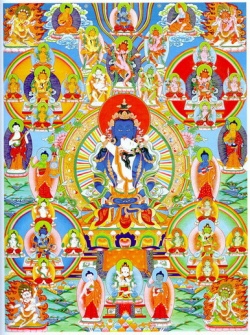Difference between revisions of "Primordial Buddha"
| (7 intermediate revisions by 3 users not shown) | |||
| Line 1: | Line 1: | ||
[[File:AdiBuddha-3.jpg|thumb|250px|]] | [[File:AdiBuddha-3.jpg|thumb|250px|]] | ||
| − | |||
| − | |||
| − | |||
| − | [[Adi-Buddha]] is better compared to the abstracted forces of [[Brahman]], Ayn Sof or Arche rather than a personal [[creator]] [[God]] in the mold of Yahweh or {{Wiki|Ishvara}}. Also, [[Adi-Buddha]] is not said to be the [[creator]], but the originator of all things. [[Adi-Buddha]] is a [[deity]] in an [[Emanationist]] [[sense]]. | + | |
| + | |||
| + | |||
| + | |||
| + | |||
| + | |||
| + | |||
| + | In [[Vajrayana Buddhism]], the [[Adi-Buddha]], or [[Adibuddha]] ([[Tibetan]]: ''[[Dang-po'i sangs-rgyas]]''), is the "[[Primordial Buddha]]." | ||
| + | |||
| + | The term refers to a [[self-emanating]], self-originating [[Buddha]], {{Wiki|present}} before anything else existed. | ||
| + | |||
| + | [[Samantabhadra]]/[[Samantabhadri]] and [[Vajradhara]] are the best known names for [[Adi-Buddha]], though there are others. [[Adi-Buddha]] is usually depicted as [[dark blue]]. | ||
| + | |||
| + | The {{Wiki|concept}} of [[Adi-Buddha]] is the closest to [[monotheism]] any [[form]] of [[Buddhism]] comes. | ||
| + | |||
| + | Even then, [[Adi-Buddha]] is [[recognized]] as the center of an extended array of [[Peaceful]] and [[Wrathful]] [[Deities]], which are considered reflections of it. | ||
| + | |||
| + | All famous [[sages]] and [[Bodhisattvas]] are said to be reflections of [[Adi-Buddha]], and many are identified as the "[[personality]]" of it. | ||
| + | |||
| + | |||
| + | [[Adi-Buddha]] is better compared to the abstracted forces of [[Brahman]], Ayn Sof or [[Arche]] rather than a personal [[creator]] [[God]] in the mold of {{Wiki|Yahweh}} or {{Wiki|Ishvara}}. | ||
| + | |||
| + | Also, [[Adi-Buddha]] is not said to be the [[creator]], but the originator of all things. [[Adi-Buddha]] is a [[deity]] in an [[Emanationist]] [[sense]]. | ||
| + | |||
| + | [[Adi-Buddha]] is a [[representation]] of the [[interdependence]] of [[phenomena]], being an [[entity]] that can be regarded as a creator in a [[relative]] [[sense]]. | ||
| + | |||
| + | Though [[phenomena]] can be [[symbolically]] represented in the [[primordial nature]] of [[Adi-Buddha]] and have in it their collective source, the [[universe]] is not regarded as being linearly created, being in a continuous, [[eternal]] co-relation with the [[deity]]. | ||
| + | |||
| + | It also represents the [[non-duality]] between the noumenom (the individual's [[mind]]), and the [[phenomena]] (the [[cosmos]]), which are also seen as {{Wiki|interrelated}} | ||
| + | |||
{{R}} | {{R}} | ||
[http://www.bahaistudies.net/asma/adibuddha.html www.bahaistudies.net] | [http://www.bahaistudies.net/asma/adibuddha.html www.bahaistudies.net] | ||
[[Category:Adi-Buddha]] | [[Category:Adi-Buddha]] | ||
Latest revision as of 15:03, 27 December 2023
In Vajrayana Buddhism, the Adi-Buddha, or Adibuddha (Tibetan: Dang-po'i sangs-rgyas), is the "Primordial Buddha."
The term refers to a self-emanating, self-originating Buddha, present before anything else existed.
Samantabhadra/Samantabhadri and Vajradhara are the best known names for Adi-Buddha, though there are others. Adi-Buddha is usually depicted as dark blue.
The concept of Adi-Buddha is the closest to monotheism any form of Buddhism comes.
Even then, Adi-Buddha is recognized as the center of an extended array of Peaceful and Wrathful Deities, which are considered reflections of it.
All famous sages and Bodhisattvas are said to be reflections of Adi-Buddha, and many are identified as the "personality" of it.
Adi-Buddha is better compared to the abstracted forces of Brahman, Ayn Sof or Arche rather than a personal creator God in the mold of Yahweh or Ishvara.
Also, Adi-Buddha is not said to be the creator, but the originator of all things. Adi-Buddha is a deity in an Emanationist sense.
Adi-Buddha is a representation of the interdependence of phenomena, being an entity that can be regarded as a creator in a relative sense.
Though phenomena can be symbolically represented in the primordial nature of Adi-Buddha and have in it their collective source, the universe is not regarded as being linearly created, being in a continuous, eternal co-relation with the deity.
It also represents the non-duality between the noumenom (the individual's mind), and the phenomena (the cosmos), which are also seen as interrelated
